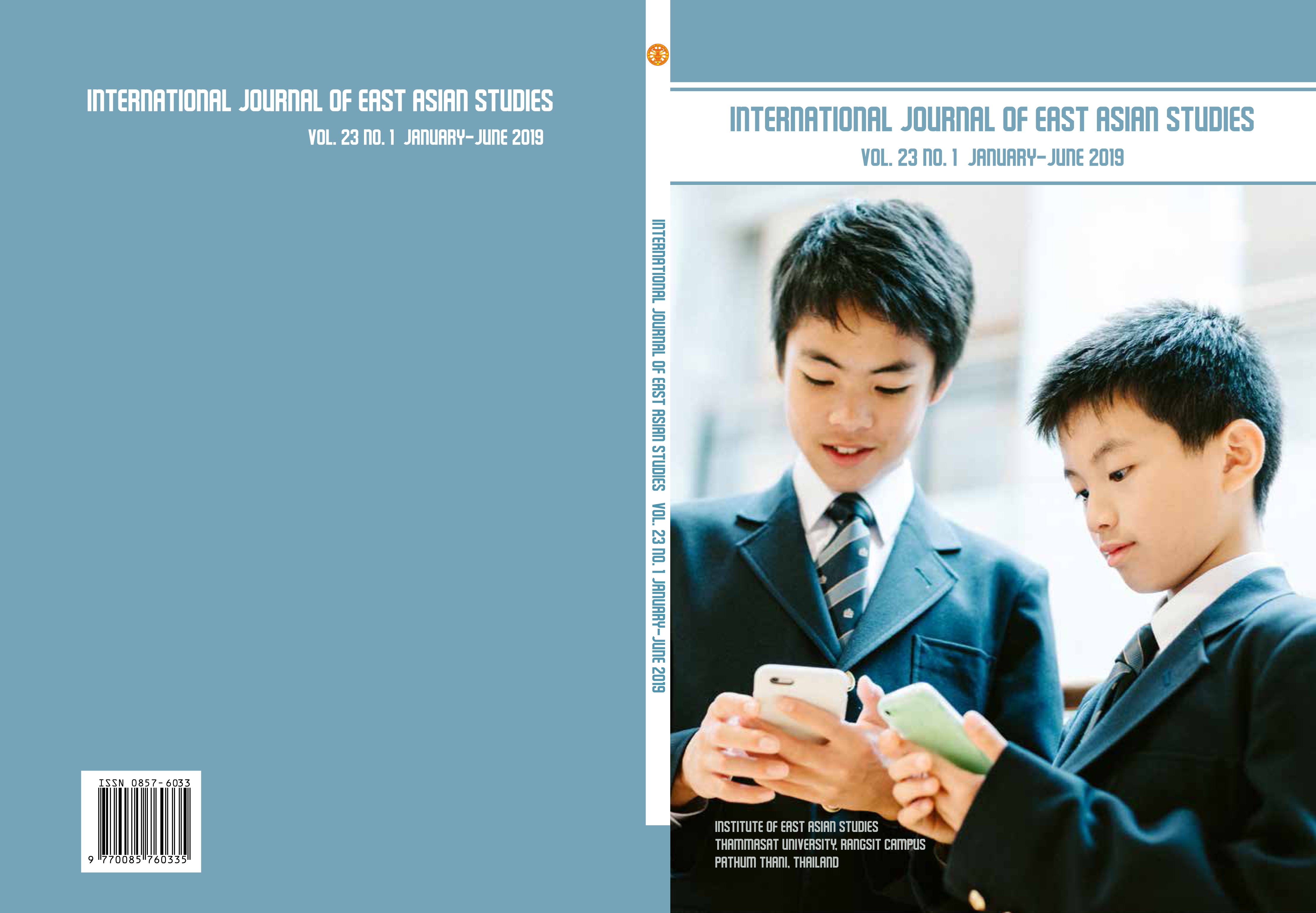A Model for the Assimilation of Organisational Culture for the Communication of Sino-Thai Culture of Confucius Institutes in Bangkok and the Surrounding Area
Keywords:
assimilation, organisational culture, Sino-Thai culture, Confucius InstituteAbstract
The Kingdom of Thailand and the People’s Republic of China have had a cultural relationship for a long time. The Confucius Institute is an international organization aiming to teach the Chinese language in Thai secondary schools. The organisational culture within this organization can bring success and efficiency. Therefore, this research focuses on the history, problems and study of different solutions to the current organisational culture of the Confucius Institute and Sino-Thai relationships in Bangkok and its surrounding provinces. This study is conducted through cultural qualitative research. The study methods include interviews, focus group discussions and meetings with 95 individuals. The data was analyzed by typological analysis, analytic induction, triangulation and descriptive analysis. The research shows that the Confucius Institute was founded on November 21, 2008 through collaboration between the Confucius Institute Headquarters, The International Office for Promotion of Teaching and Learning of the Chinese Language (HANBAN), the Thai Ministry of Education and the management team of each secondary school. Each Confucius Institute within the schools has its own unique history. They were founded within secondary schools for a special purpose. They serve as one of many departments under the school’s management team. Their mission is to teach the Chinese language to both students in that school and other people in the community, employing Chinese teachers and study material support from HANBAN. The management team is composed of people from both Thailand and China. The organizational culture has been assimilated through mutual work in the community where the school is located. The success of the assimilation relies upon the application of the local organizational culture, kinship culture, success-oriented culture and a tight-knitted community spirit. Currently, Confucius Institutes are located in various secondary, public and private schools. They are managed internally. The mission is to teach the Chinese language to the students and prepare Chinese-language curricula to suit student needs. Moreover, the institutes are responsible for cultural exchange activities in different forms under the supervision of the Sino-Thai management team, as well as the school director. The activities are supposed to be based on the HANBAN curriculum. However, there are problems with the organizational culture and cultural communication, especially unclear organizational culture policy, lack of unity, structural inefficiency and poor system management. The internal environment is not suitable for work. The success of Chinese classrooms within the school system and outside the school system is not concrete. Also, there are not enough Chinese teachers and they are not able to communicate effectively to students. Not all of the teachers are able to represent the Chinese culture well. Some find it difficult to take part in the activities, or even get used to the new environment in Thailand. The Sino-Thai culture exchange is still not applicable in the curriculum. Other problems include a lack of teaching materials and funding, discontentment among Chinese teachers with their teaching experience in Thailand, and lack of pride in Sino-Thai cultural exchange. The assimilation model of organizational culture in Confucius Institutes for the Sino-Thai communication presented in this paper is a semantic model.
Downloads
References
Chambers, M. R. (2005). ‘The Chinese and the Thais are brothers': The evolution of the Sino–Thai friendship. Journal of Contemporary China. 14(45): 599-629.
Durrer, V., O'Brien, D., & Miller, T. (2017). Exporting culture: the Confucius institute and China’s smart power strategy. In V. Durrer, T. Miller & D. O’Brien (Eds.) The Routledge Handbook of global cultural policy (pp. 253-266). London: Routledge.
Gil, J. (2017). Soft Power and the worldwide promotion of Chinese language learning: The Confucius Institute Project. London: Multilingual Matters.
Hartig, F. (2012). Confucius institutes and the rise of China. Journal of Chinese Political Science. 17(1): 53-76.
Jantawanit, S. 1999. Qualitative research. Bangkok: Chulalongkorn University Press.
Paradise, J. F. (2009). China and international harmony: The Role of Confucius institutes in bolstering Beijing’s soft power. Asian survey. 49(4): 647-669.
Sharp, A. (2010), Confucius Institutes adopt a sage approach to cultural understanding. Asian Currents. 10(5): 1-4.
Song, J. (2017). HANBAN Confucius classrooms and the learning of Chinese language and culture in Thai schools. Doctoral dissertation, Chulalongkorn University, Bangkok, Thailand.
Switzer, A. (2018). The Consequences of Confucius institutes: Understanding the opposition. Doctoral dissertation, Georgetown University, Washington, D.C., USA.
Van Chinh, N. (2014). Confucius institutes in the Mekong Region: China's soft power or soft border?. Issues and Studies. 50(4): 85-117.
Wen, W. (2016). China’s approach toward the regional cooperation with ASEAN. In C. S. Collins, M. N. N. Lee, J. N. Hawkins & D. E. Neubauer (Eds.) The Palgrave handbook of Asia Pacific higher education (pp. 173-182). Palgrave Macmillan, New York.
Wongsurawat, W. (2017). Rise of the Red capitalists: PRC influence and the new challenge of the royalist-Chinese business alliance in Thailand. In Y. Santasombat (Ed.) Chinese capitalism in Southeast Asia (pp. 35-55). Palgrave Macmillan, Singapore.
Xia, L. (2017). The Present situation of development, problems and countermeasures of Confucius Institute in Thailand. Around Southeast Asia. 4(13).
Ye, W., & Edwards, V. (2018). Confucius institute teachers in the UK: motivation, challenges, and transformative learning. Race Ethnicity and Education. 21(6): 843-857.
Ying, W. U., & Wen-jing, T. I. (2009). The Development Status and Problems of Confucius Institute. Journal of Yunnan Normal University (Teaching and Research on Chinese as a Foreign Language Edition). 5(1): 8-20.
Yinghui, W. (2011). A country's hard power is the decisive factor in the globalization process of its language - inspiration for Chinese globalization from the globalization processes of five UN working languages. Chinese Language Globalization Studies. 1(1): 3-10.
Zhao, H., & Huang, J. (2010). China’s policy of Chinese as a foreign language and the use of overseas Confucius Institutes. Educational Research for Policy and Practice. 9(2): 127-142.



